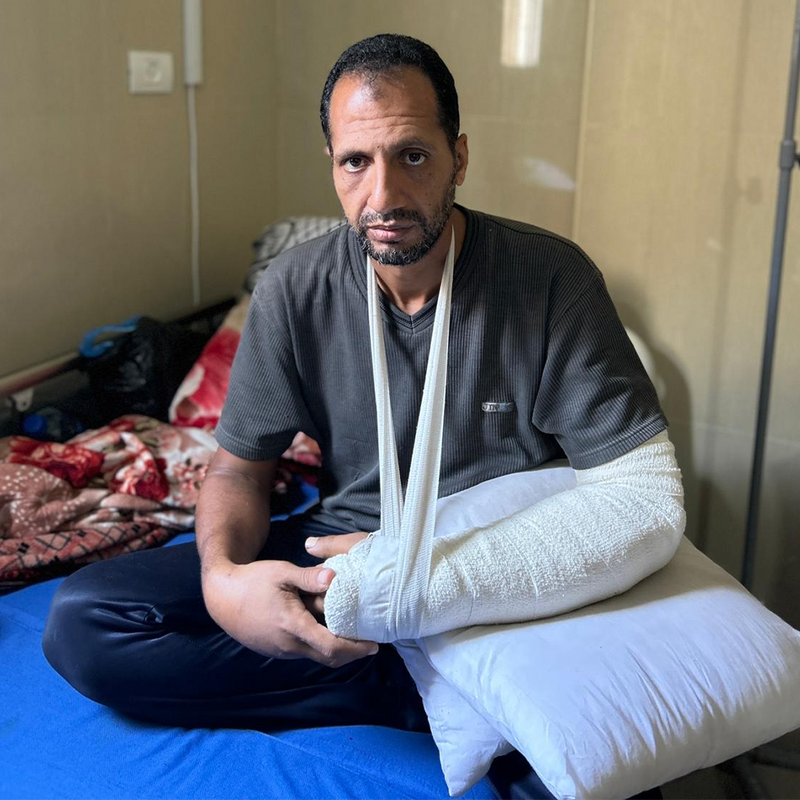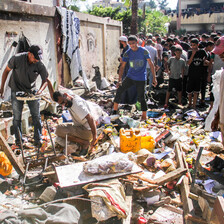The Electronic Intifada 25 November 2024
The first missile the Israeli occupation forces fired at the Abu Nasr family home in Beit Lahiya, northern Gaza, on 28 October hit the stairwell.
Around 300 members of the extended Abu Nasr family had taken shelter in the 10 apartments of the five-story building, and the stairwell was the only escape route.
After that first missile was fired at 10 pm that night, the majority of people in the building could not escape. When the second missile was fired, at 4 am the next morning, only 15 members of the extended family survived: 10 children and five men.
The Electronic Intifada interviewed several of the survivors who are currently receiving care at al-Helou International Hospital in Gaza City.
Here are their testimonies.
Hani Abu Nasr
Hani Abu Nasr is 39 years old. His wife and sons were killed in the Israeli attack.

Hani Abu Nasr, 39, at al-Helou Hospital in Gaza City.
“The occupation forces fired a reconnaissance missile at the building’s staircase [on 28 October at 10 pm], blocking a critical escape route. Unaware that further strikes would follow, only my brother, who lived on the ground floor and did not need to use the stairs, managed to escape with his wife and children.
“The remaining family members and I were trapped and unable to evacuate, so we called Civil Defense and ambulance services, only to be told that no assistance could reach us at that time. We gathered our belongings, hoping to seek help at dawn. Tragically, the occupation forces struck again, shattering that hope.
“The occupation aircraft attacked the building with missiles from an F-16 [on 29 October at 4 am], reducing the house to a pile of rubble.
“When the airstrike happened, I didn’t hear or feel anything. I woke up and found myself on the roof of a building next to ours. It was morning, and I could hear people screaming and the sound of neighbors pulling victims from our house and the nearby houses that had also been damaged by the airstrike, including the Odeh family’s home.
“My arm was bleeding, and the pain was excruciating. My ribcage hurt, and I felt as though it was fractured. I couldn’t speak or scream, and there was no one around to see me or help. Looking around, I saw stones scattered across the surface where I lay. I tried to crawl on my back to the edge of the roof and began throwing stones to get someone’s attention. After the third attempt, I finally heard someone say, ‘There is someone here.’”
Neighbors arrived and lifted Hani onto a horse-drawn cart and took him to al-Awda hospital. He was not aware that his wife and four children had been martyred.
He remained at al-Awda hospital for three days, unable to be transferred because of nonstop Israeli attacks on northern Gaza.
When he arrived at al-Helou hospital in Gaza City, doctors found that he had a fractured left arm and a bronchial rupture, which is “a life-threatening lesion” that is caused by blunt force to the chest.
Muhammad Abu Nasr
Muhammad Abu Nasr, 29, is Hani Abu Nasr’s brother, mentioned above by Hani as the family member who escaped with his wife and children after the first Israeli strike.
“When the explosion happened and the outer wall of the building collapsed into my home, I knew we were in danger and had to get out. I jumped over the wall and saw that the building’s staircase had been destroyed, leaving no way for my family to escape without the help of Civil Defense or ambulance crews. I [didn’t know] whether to save myself and my family or stay and face death with the rest of them.”
Muhammad jumped over the wall, and his wife had to throw their children over the wall to him. They fled to a neighbor’s house, unable to travel long distances at night with quadcopters patrolling the skies.
“I didn’t sleep that whole night, thinking about my parents, my brothers, my nieces, and nephews. How could I have left them and run away? Was I really a coward, a traitor? Thoughts tormented me, and I couldn’t tell whether I had done the right thing or not.
“Eventually, I fell asleep, but only for ten minutes. I woke to the sound of an explosion louder than anything I’d ever heard. It felt like an earthquake had shaken the entire area, with the ground trembling violently and parts of the walls in the house I’d taken refuge in collapsing. I realized then that the sound came from the targeting of my family’s house.
“I could hear my family’s voices, screaming and pleading for help. They were saying there were many wounded, and there were martyrs. The pain was unbearable, made worse by the fact that I couldn’t go out. Everyone told me not to, warning that I’d be putting myself in danger. I had to wait until morning because the [Israeli] air force was patrolling the skies. I sat there, listening to my family’s cries, powerless to help.”
Muhammad recovered 117 bodies from the rubble and said that he believed an additional 130 were still buried under the rubble.
Aida Abu Nasr
Aida Abu Nasr, 15, survived, yet all of her immediate family was martyred.
“We lived on the fifth floor, and when the reconnaissance missile struck [on 28 October], my mother, my sister and I were injured. We had been sleeping next to each other in the living room. The rest of my family was unharmed, but they couldn’t do anything to help us because no one could get out. Our injuries weren’t severe at first, but we were bleeding, and I had terrible pain in my legs.”
They shouted and called for help, but no one responded. Those who were uninjured began preparing bags and gathering essential items, hoping to leave in the morning.
“When the missiles from the F-16 hit [at 4 am], I didn’t hear anything, but I never lost consciousness. At first, a thick black cloud blocked my vision, but gradually, everything cleared. I found myself between my mother and my sister. The section we were on was tilted and about to collapse. I survived because I was on the top floor, but those injured on the lower floors continued to bleed out, unable to be rescued.

Aida Abu Nasr, 15, at al-Helou Hospital in Gaza City.
“My mother was clinging to my right arm, and my sister Rania was holding on to my left arm, afraid of falling. They were both injured, and I kept asking, ‘Are you okay?’ They could only gesture with their eyes; they couldn’t speak.
“My leg was [trapped under a block of concrete], and I was screaming and begging for help while my other foot was trapped under the rubble. Whenever I tried to free it, my mother held on to me even tighter, terrified of falling.
“I stayed still, holding my position to reassure them. Then, suddenly, I felt her hand slip from my arm. I turned to look and saw that she had died, and my pregnant sister on the other side had passed away before her, without me even noticing.
“I kept trying to free my foot until, after several attempts, I finally succeeded. By then, morning had come, and I was limping because of my injured foot, walking over the remains of my brothers, mother and father, shouting, ‘Help me, help me.’”
Aida was taken to al-Awda hospital on a cart. Rescue teams tried to recover what they could of her family, but they only retrieved her mother and sister.
Aida was eventually transferred from al-Awda hospital to al-Helou hospital.
Bassam Abu Nasr
Bassam Abu Nasr is 5 years old and is the only survivor from his immediate family.
Both of his legs were fractured in the Israeli attack, and he has third-degree burns on his body. He will require several more surgeries and urgently needs medical treatment abroad.
Bassam cries and screams, constantly asking for his father. He remembers seeing his father in a horrific state, with his head open and bleeding.
Bassam was found in a neighbor’s house and taken to al-Awda hospital, where he stayed for three days in severe psychological distress, pleading for his parents and repeatedly calling out his siblings’ names.
By the time he arrived at al-Helou hospital, he was in a dire state. He relies on sedatives and painkillers, and without them, he suffers from intense crying episodes.
The only words I heard him say, over and over, were, “I want my father.”
Asil Almanssi is a writer based in Gaza.





